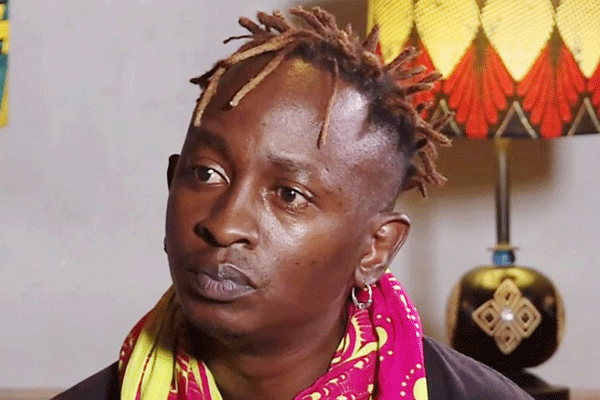
in the groove:with Fred Zindi
Apopular dreadlocked Zimdancehall artiste (name withheld) is currently being accused of impregnating a 16-year-old schoolgirl who is about to write her O’ Level in November. The girl’s father has made a police report and the artiste is going to be in court next month.
I asked this troubled artiste why he decided to have this under-age girl as his lover. His response was: “You know, these young girls, when they see us perform, they literally throw themselves at us and I for one just find it difficult to resist them.”
According to him this young girl approached him as he was walking in their neighbourhood. She screamed out his name and asked him for an autograph and a selfie. Things progressed from there and he found it hard to stop what was going on. The next day he was back in that area and he took this girl to lunch after which they had sex at a friend’s place. This artiste is already married and cannot contemplate getting married to this under-age girl. So, he is waiting for his day in court.
This is not an isolated case. I was also talking to a musician friend in Kenya, Eric Wainana, this week and casually mentioned this case.
He told me that in Kenya, that is the core business of many artistes nowadays as many idle musicians are just roaming about the streets looking to abuse female fans, especially schoolgirls who recognise them. He says that this is all due to the Covid-19 pandemic which has deprived artistes of work. It has also had an impact on all teenage girls around the world.
Since containment measures were put in place in Kenya, including closing schools and restricting movement, accessing sexual and reproductive health and rights (SRHR) information and services has become very challenging for girls and women. This is on top of cultural expectations surrounding abstinence, which already impacted young people’s confidence in seeking sexual and reproductive health services.
Kate Maina-Vorley, Plan International Kenya’s country director, said: “It is alarming that so many teenage girls have fallen pregnant during lockdown, which can have lifelong consequences for them. We are extremely concerned about their well-being and their access to health care and other support services.
- Chamisa under fire over US$120K donation
- Mavhunga puts DeMbare into Chibuku quarterfinals
- Pension funds bet on Cabora Bassa oilfields
- Councils defy govt fire tender directive
Keep Reading
“Our research shows that the majority of teenage pregnancies are unintended. Even before the crisis, girls and young women in Kenya faced considerable challenges in accessing essential health information and services. Now, amid a pandemic that is straining even the strongest healthcare systems, there is a real risk that sexual and reproductive health and rights will be deprioritised, with devastating consequences for girls and women.”
According to research conducted by Plan International last year across nine counties in Kenya, unintended or unwanted teenage pregnancy was a huge issue for girls, significantly impacting their lives. The research found:
Ninety-eight percent of pregnant girls were not in school, and 59% of the pregnancies among girls aged 15-19 years were unintended.
Fourty-five percent of severe abortion complications were also reported among adolescent girls.
Sexual violence is believed to affect about one-third of girls and one-sixth of boys under 18, but most do not discuss their experiences or receive assistance.
About 54% of sexually active adolescent girls in Kenya did not intend to get pregnant and have an unmet need for modern contraception.
“As the government continues to ensure the spread of Covid-19 is minimised, it is important that we mitigate the gendered fall-out of the pandemic that is affecting children and in particular adolescent girls in Kenya,” said Maina-Vorley.
According to the World Health Organisation, complications relating to pregnancy and childbirth are already the leading cause of death for girls aged 15-19 globally. Pregnant girls and young mothers face even greater risks in crises such as the ongoing pandemic.
With schools shut down around the world to prevent the spread of the coronavirus, girls are missing out on learning opportunities and are more likely to experience violence and abuse at home, unplanned pregnancies, child marriage, and economic hardships.
The same thing is also being experienced in neighbouring countries such as Mozambique, Malawi, South Africa and Zambia.
Rufus Maculuve — a friend in Maputo, Mozambique — is busy organising a fund to help both the artistes and young schoolgirls with the hope that with a bit of cash in their pockets, economic hardships will be lessened and they do not end up doing improper things.
In early May, about two months after schools across Malawi closed because of Covid-19, Eliza Chikoti received a phone call from a former student, a bright 15-year-old girl who always got good results at school.
“She called me and said: “Madame, I’m thinking of getting married’,” says Chikoti.
Chikoti (24) works for CAMFED, an international organisation that supports girls’ education. Part of her work is mentoring girls in the town of Mwanza — offering them support and guidance in their studies.
The student’s message was discouraging. “I was like, why are you opting to go into marriage?” says Chikoti.
The girl explained that she was living with her grandparents in a house of six people. Since the pandemic began, the family has been struggling to put food on the table.
Chikoti says the girl told her: “If I can go into marriage, if they can find a husband who can marry me, maybe he can be able to support me.”
With schools out of session, there’s special concern about the female students in this small southern African country, one of the poorest in the world. Girls are desperate to help their families survive the tough times — and more likely than boys to turn to child marriage as a way to ease economic strains.
Covid-19 lockdown is also linked to the high number of unintended teenage pregnancies in Kenya.
Fortunately for the Zimbabwean 16-year-old who was impregnated by the artiste, she will be able to write her O’ Level examinations in November.
In Zimbabwe, a recent parliamentary debate resulted in changes in the Education Act. The amended Act states that schools can no longer exclude girls who fall pregnant from attending lessons. However, this girl’s future will be determined by her pregnancy as looking after a baby at 16 in a poverty-stricken condition is not a joke. Unfortunately, the young girl is already heartbroken.
As CS Lewis puts it as advice to young girls: “To love at all is to be vulnerable. Love anything and your heart will be wrung and possibly broken. If you want to make sure of keeping it intact, you must give it to no one, not even an animal. Wrap it carefully round with hobbies and little luxuries; avoid all entanglements. Lock it up safe in the casket or coffin of your selfishness. But in that casket, safe, dark, motionless, airless, it will change. It will not be broken; it will become unbreakable, impenetrable, irredeemable. To love is to be vulnerable.”
It is well-documented that an idle mind is the devil’s workshop. Perhaps state organisations such as ZTV could come up with more useful programmes on television to occupy those young people not attending school at the moment. Instead of cartoons being shown on television in the morning, teachers could be invited to give lessons to pupils, say reading, writing and arithmetic for primary school children every Monday, Wednesday and Friday, and then more complex subjects such as Biology, Mathematics and Sciences for secondary school children every Tuesday and Thursday. Parents can be asked to ensure that their children are following those programmes as scheduled. Watching these programmes on television at the scheduled times will be back to school for most of these youngsters including those who find internet connectivity an expensive luxury. That will occupy some, if not all, of those idle minds.
Artistes, on the other hand, should refrain from encouraging these vulnerable girls by avoiding the writing of songs such as Ngatiite Musikanzwa Babe. Such songs will only land some of them in deep trouble. Seen!
l Feedback: [email protected]











